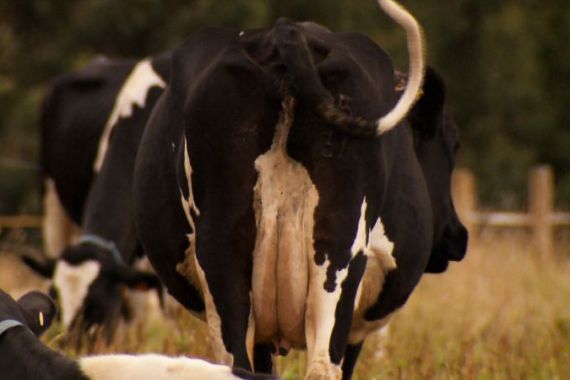
A change in the wind
A new diet cuts the methane emissions of Australia’s cows by 20%, the equivalent of taking 200,000 cars off the road.
Burping cows have become the comic relief of the global warming debate, but livestock emissions are no laughing matter. Every year, the world’s 1.2 billion ruminants produce 80 million tonnes of methane, or 28 per cent of global methane emissions. Just one grazing dairy cow belches around 600 litres per day. Methane is a greenhouse gas 21 times more potent than carbon dioxide.
Home to 29 million cows, Australia is the world’s second-largest beef exporter and has a huge dairy industry. The country has one of the highest per capita carbon emission levels, and with three million tonnes of methane released by livestock each year, red meat is not looking so green.
Keep reading
list of 4 itemsLost Futures
Photos: Greek valley that became a lake stirs drought debate
Botswana threatens to send 20,000 elephants to Germany
But in a breakthrough hailed by environmentalists and agriculturalists, scientists at Victoria’s Department of Primary Industries labs have discovered an unusual feed supplement that is leading many to raise a glass in celebration. By feeding cows grape marc – the skin, sticks and seeds left over from commercial red wine pressing – their methane emissions can be cut by around 20 per cent, the equivalent of taking 200,000 cars off the road. Not only does the discovery mean a considerably reduced eco-footprint for meat eaters and livestock producers, but it is a boon to Australia’s enormous wine industry (the country is the world’s fourth-largest wine exporter), turning a waste product into a saleable and environmentally sound commodity.
A team led by senior dairy researcher Dr Peter Moate has been testing how feeding grazing cows various different products affects their methane emissions, including brewers’ grains, cold-pressed canola meal, cottonseed meal, and hominy meal. Results were modest but held promise – one that was fulfilled when they experimented with grape marc. The supplement produced a 20 per cent cut in methane emissions – the largest reduction through a feed product ever discovered. What is more, the research suggests that the grape marc supplement could boost milk production by five per cent. About 200,000 tonnes of marc is produced by the wine industry each year in Australia, the majority of which would otherwise be left to rot – adding dangerous levels of CO2 to the atmosphere itself.
Dr Moate has high hopes for the future. His team is testing a variety of feed supplements and novel management practices, and his goal is to develop a technique which could reduce methane emissions from cattle by up to 50 per cent. He is also conducting genomic studies on the animals with the objective of identifying a DNA marker for low methane emitting cows.
Tamara Sheward heads to the heart of Victoria’s lush dairy belt to meet Dr Peter Moate and young heffer Mona, who has been fitted with a special yoke to monitor how the new grape marc diet is affecting her methane emissions.
earthrise airs each week at the following times GMT: Friday: 1930; Saturday: 1430; Sunday: 0430; Monday: 0830. Click here for more on earthrise. |
